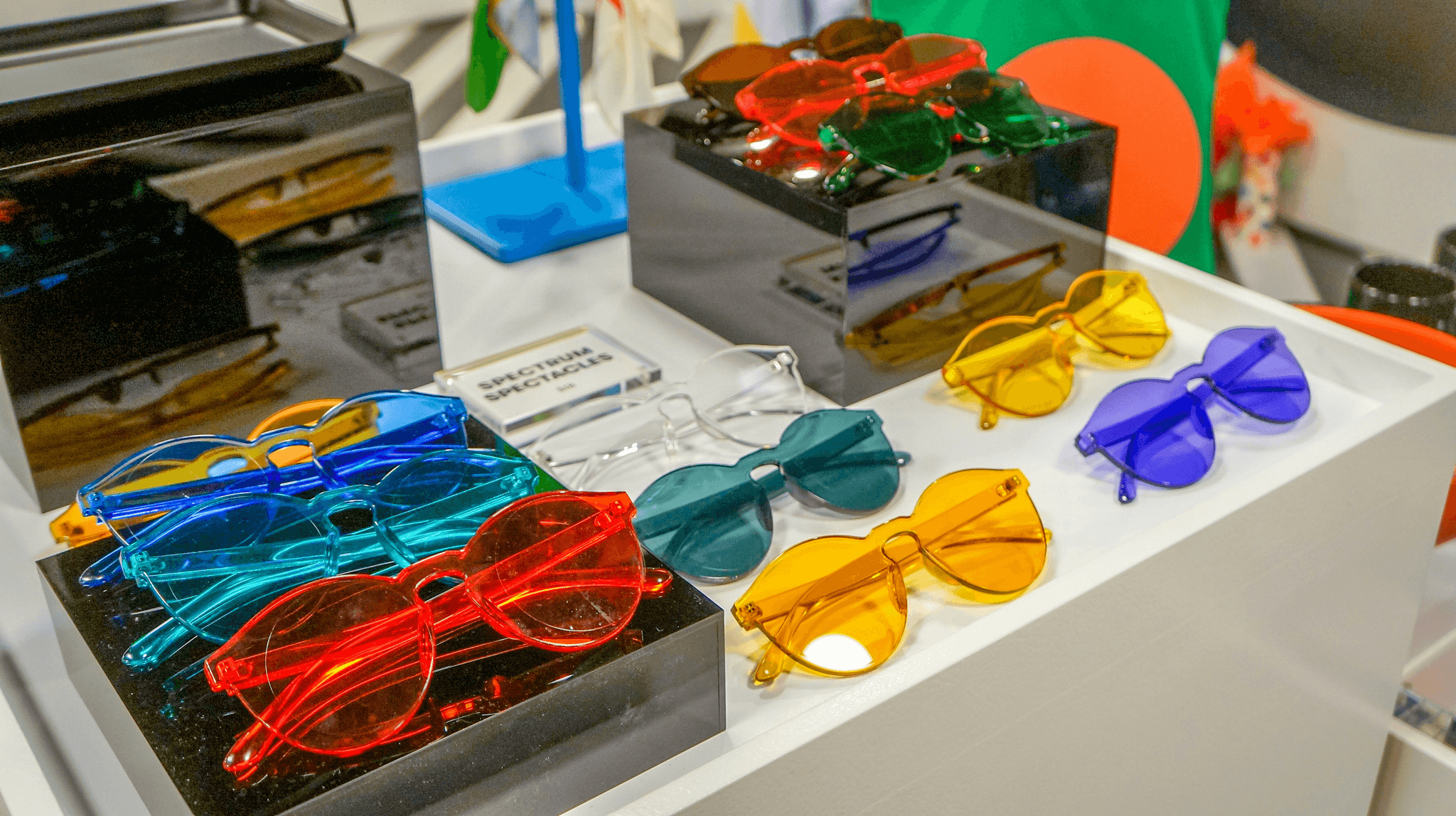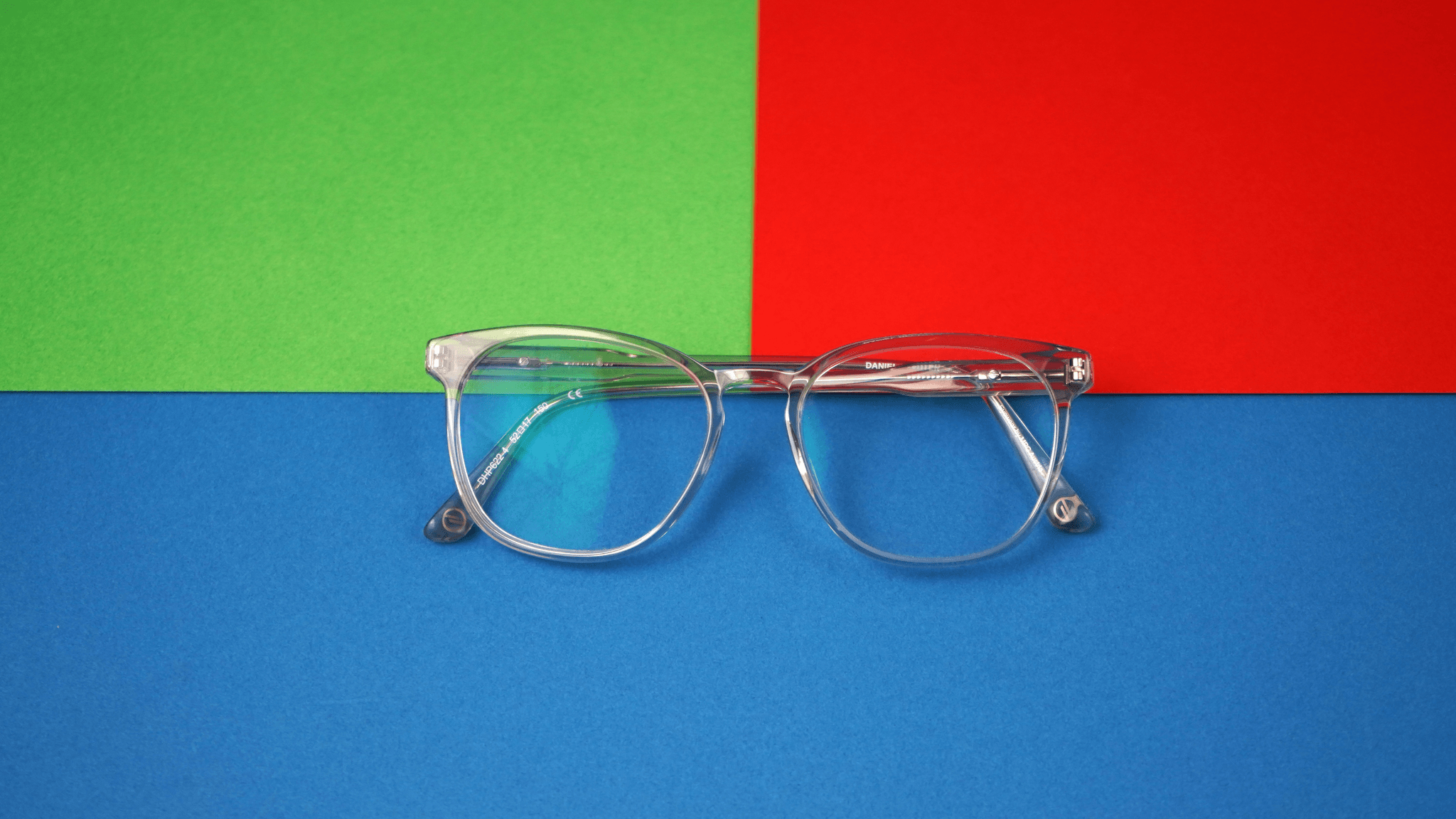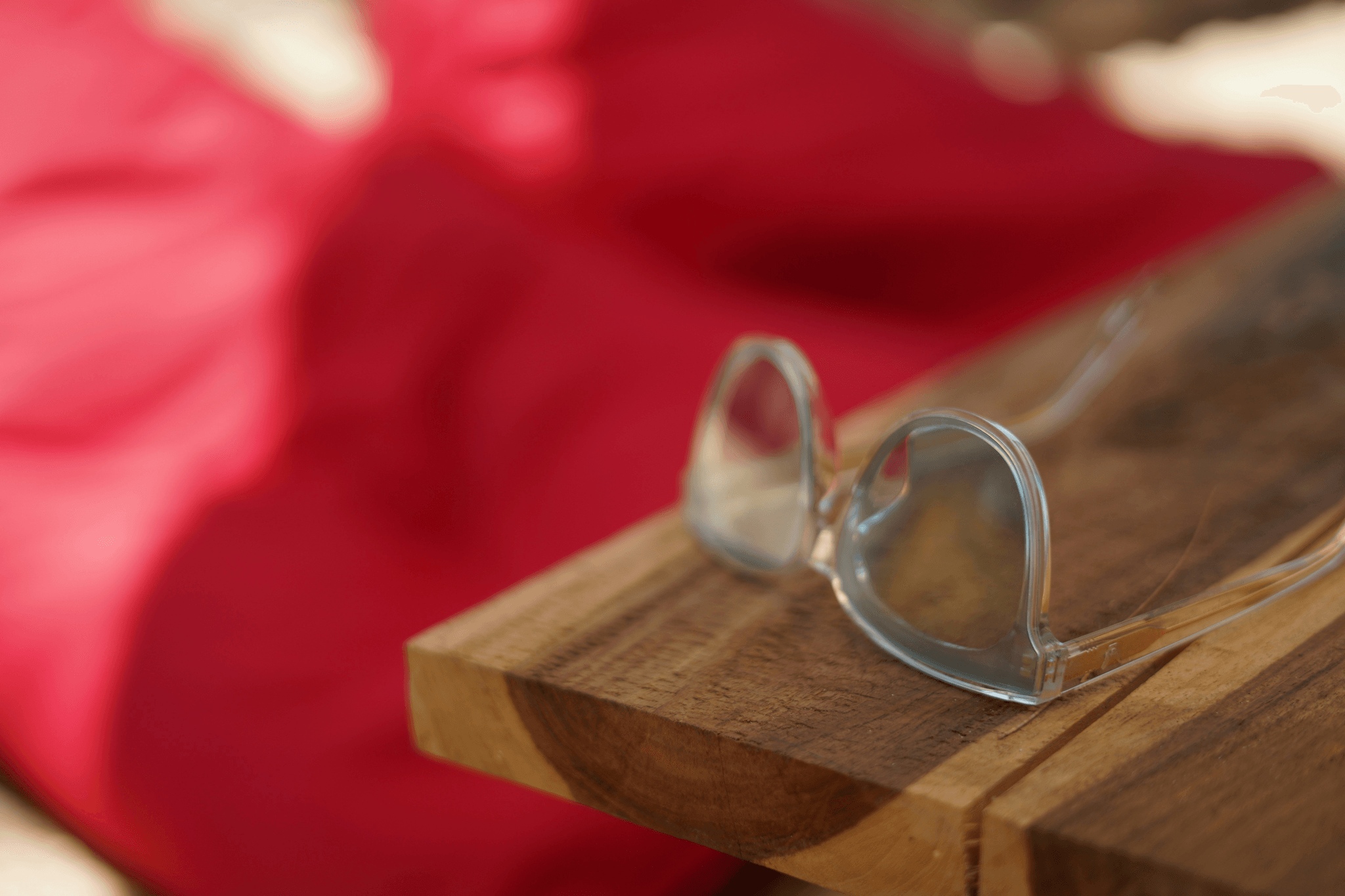Introduction

In the world of eyewear, acetate glasses have emerged as a stylish and practical choice for many. With their vibrant colors and unique designs, they capture attention while also offering comfort and durability. But what exactly is acetate in glasses, and how does it compare to other materials like plastic or metal?
The Allure of Acetate Glasses
Acetate glasses are not just about looks; they embody a blend of fashion and function that appeals to a wide range of wearers. Their ability to hold rich colors and intricate patterns makes them stand out in any collection, creating an allure that’s hard to resist. However, before you dive into the world of acetate glasses UK trends, it's essential to weigh their benefits against potential drawbacks.
Understanding Acetate in Eyewear
So, what is acetate in glasses? It’s a plant-based plastic derived from cellulose fibers, making it both lightweight and flexible—perfect for crafting comfortable eyewear frames. This eco-friendly material not only enhances aesthetics but also offers durability that can sometimes surpass traditional plastic options.
Are Acetate Glasses Right for You?
When considering whether acetate glasses are better than plastic or metal options, it's crucial to evaluate your personal style and needs. While acetate provides unique advantages like vibrant colors and comfort, some may wonder: what are the disadvantages of acetate glasses? By understanding these factors, you can make an informed decision about which eyewear will best suit your lifestyle.
What Is Acetate in Glasses?

When it comes to understanding the ins and outs of acetate glasses, we first need to dive into what acetate actually is. Acetate is a plant-based plastic derived from cellulose, making it a popular choice for eyewear. This eco-friendly material not only offers a range of vibrant colors but also provides a unique blend of durability and comfort, making it an appealing alternative to traditional plastic options.
The Origin of Acetate
Acetate has an interesting history that dates back to the early 20th century when it was first developed as a synthetic fiber. Initially used in textiles, its lightweight and flexible properties soon caught the attention of eyewear manufacturers looking for stylish yet functional materials. Today, acetate glasses are a staple in the fashion industry, with brands around the world embracing this versatile material for its aesthetic appeal and sustainable origins.
How Acetate Is Made
The process of creating acetate involves transforming natural cellulose from wood pulp or cotton into a usable form for eyewear production. This transformation includes dissolving cellulose in acetic acid and then extruding it into sheets that can be cut into various shapes and sizes for frames. The result is lightweight yet strong acetate glasses that can be easily molded into fashionable designs without sacrificing quality.
Unique Properties of Acetate
What sets acetate apart from other materials like plastic or metal? For starters, acetate glasses are known for their vibrant color options and patterns that can elevate any outfit while providing UV protection for your eyes. They also offer excellent flexibility compared to traditional plastics; however, one must consider What are the disadvantages of acetate glasses? such as potential weight concerns or susceptibility to scratches if not cared for properly.
In summary, if you're pondering Are glasses better with plastic or acetate? it's essential to weigh these unique properties against your personal preferences and lifestyle needs before making a decision on your next pair of frames.
Acetate Glasses vs Plastic

When it comes to choosing the right eyewear, the debate between acetate glasses and plastic frames is as lively as a fashion show runway. Both materials have their merits, but understanding their differences can help you make an informed decision. So, are glasses better with plastic or acetate? Let’s dive into the nitty-gritty of these two contenders.
Comparing Durability and Flexibility
Durability is often a key factor when considering eyewear options. Acetate glasses tend to be more durable than standard plastic frames, resisting wear and tear from daily use. However, while acetate offers flexibility that allows for comfortable adjustments, some plastics can be more rigid—making them prone to breakage under pressure.
When assessing the durability of acetate glasses vs plastic frames, it's essential to consider your lifestyle. If you lead an active life where your glasses might take a bump or two, you may find that acetate holds up better over time. Yet remember that no material is indestructible; even the best acetate glasses can suffer damage if not cared for properly.
Aesthetics: Acetate's Vibrant Colors
One of the most appealing aspects of acetate is its ability to flaunt vibrant colors and patterns that catch the eye like a peacock in full display. Unlike standard plastic, which often comes in limited hues and finishes, acetate can be crafted into an array of stunning designs—from classic tortoiseshell to bold neon shades. This aesthetic versatility makes it a favorite among fashion-forward individuals who want their eyewear to reflect their personality.
When comparing aesthetics in acetate glasses vs metal frames or even other types of plastic, many find that acetate wins hands down in terms of variety and flair. The rich colors are not just surface-deep; they penetrate through the material itself, ensuring longevity in appearance even after years of wear. So if you're looking for something stylish yet durable, consider how much fun you could have with colorful acetate!
Comfort and Fit in Everyday Use
Comfort is paramount when selecting eyewear because nobody wants sore ears or a headache from ill-fitting frames! Acetate glasses tend to provide excellent comfort due to their lightweight nature compared to some heavier plastics or metals like titanium or stainless steel—especially if you're wearing them all day long at work or during leisure activities.
Additionally, many people find that acetates mold well to individual head shapes over time; this personalized fit makes them more enjoyable for everyday use compared to rigid plastics which may not accommodate unique facial features as well as acetate does. If you've ever wondered what are the disadvantages of acetate glasses? While they may require occasional adjustments for optimal fit (especially if you're prone to changes), most users agree that comfort far outweighs any minor inconveniences.
Are Glasses Better with Plastic or Acetate?

When it comes to choosing eyewear, the debate between acetate glasses and plastic options is as vibrant as the colors they come in. Both materials have their own unique advantages and drawbacks, making it essential to weigh the pros and cons carefully. Whether you're asking yourself, What is acetate in glasses? or pondering if Are glasses better with plastic or acetate?, this section will help clarify your decisions.
Pros and Cons of Each Material
Acetate glasses are celebrated for their rich color palettes and stylish designs, while plastic frames often tout lightweight durability. On one hand, acetate offers a level of flexibility that can lead to a more comfortable fit; on the other hand, plastic is known for being more resistant to impact damage. However, when considering What are the disadvantages of acetate glasses?, it's important to note that they can be heavier than their plastic counterparts and may require more care to maintain their appearance.
Plastic frames usually come with a lower price tag but might lack the luxurious feel that acetate delivers. Additionally, while both materials can be stylish, acetate glasses UK trends often showcase bold patterns that simply aren’t available in standard plastics. Ultimately, understanding both materials helps you decide whether you prefer the elegance of acetate glasses vs plastic.
Personal Preferences in Eyewear
Your choice between acetate and plastic largely hinges on personal preferences—what feels right for your lifestyle? If you prioritize style over weight or care requirements, then acetate might just be your go-to option. However, if you're constantly on-the-go or lead an active lifestyle where durability is key, you may lean towards lightweight plastic frames.
Some people love experimenting with different looks; for them, having a diverse collection of colorful acetate glasses could be incredibly appealing. Conversely, others may prefer a minimalist approach where classic metal frames or simple plastic designs win out every time. After all, comfort plays an enormous role—if your eyewear isn't comfortable enough for everyday use, it doesn't matter how good it looks!
Long-Term Performance Considerations
When evaluating long-term performance considerations between acetate glasses vs metal or plastic options, it's vital to consider how each material holds up over time. Acetate tends to age gracefully when properly cared for; however, neglect can lead to wear and tear that diminishes its aesthetic appeal over time. In contrast, while plastics are generally sturdy against scratches and impacts initially, they may not offer the same longevity when subjected to extreme conditions.
Additionally, if you're concerned about environmental impact—an increasingly popular consideration today—you might find yourself asking Is acetate plastic good? Many brands now offer eco-friendly options made from sustainable sources which could sway your decision toward acetates over traditional plastics or metals. Ultimately assessing how each material aligns with your lifestyle will guide you towards making an informed choice about which type of eyewear suits you best.
What Are the Disadvantages of Acetate Glasses?

While acetate glasses have their charm, they come with a few drawbacks that potential wearers should consider. Understanding these disadvantages can help you make an informed decision when weighing acetate glasses vs plastic or even acetate glasses vs metal options. Let’s dive into the nitty-gritty!
Weight Concerns
One of the primary concerns surrounding acetate glasses is their weight. Compared to lighter materials like plastic, acetate can feel a bit heftier on your face, especially during long wear periods. For those who prioritize lightweight eyewear, this might lead to discomfort or fatigue throughout the day.
Potential for Damage
Another issue with acetate glasses is their susceptibility to damage. While they are generally durable, they can crack or warp if exposed to extreme heat or pressure—something that’s more common than you might think! If you’re someone who tends to be rough on your eyewear, you may want to weigh whether the allure of acetate outweighs its fragility compared to other materials.
Care and Maintenance Needs
Finally, let’s talk about care and maintenance needs when it comes to acetate glasses. Unlike some plastic frames that require minimal upkeep, acetate demands a bit more attention to keep them looking pristine. Regular cleaning with appropriate solutions and careful storage are essential practices if you want your stylish frames to last—and nobody likes extra chores!
Acetate Glasses UK Trends

In the ever-evolving world of eyewear, acetate glasses have carved out a niche that’s hard to ignore. With their vibrant colors and unique designs, they reflect a blend of style and functionality that appeals to many. As trends shift towards sustainable materials, the popularity of acetate glasses in the UK continues to rise.
Eco-Friendly Options Available
In today's environmentally conscious society, eco-friendly options are becoming increasingly important when selecting eyewear. Many brands now offer acetate glasses made from renewable resources or recycled materials, making them an attractive choice for eco-minded consumers. Is acetate plastic good? When sourced responsibly, it can indeed be a sustainable option compared to traditional plastics.
Additionally, some companies are focusing on reducing waste during production processes while maintaining high-quality standards for their acetate frames. This commitment not only benefits our planet but also ensures that you receive a durable product—one of the critical considerations when evaluating what are the disadvantages of acetate glasses? By choosing eco-friendly options, you can enjoy stylish eyewear while supporting sustainable practices.
How to Choose the Right Pair
Selecting the right pair of acetate glasses involves considering several factors beyond just aesthetics. First off, think about your face shape; certain styles will complement your features better than others. You should also weigh comfort against style—while some may prefer lightweight options found in plastic frames, others might find that well-crafted acetate offers superior comfort over time.
Moreover, consider how often you'll wear them; if you're looking for everyday use or special occasions will influence whether you lean towards more classic designs or trendy statements like those seen in current acetate glasses UK collections. Lastly, don’t forget about lens options! Whether you need prescription lenses or want blue light filtering technology integrated into your new frames can make all the difference when deciding between acetates or other materials like metal.
Conclusion
As we wrap up our exploration of acetate glasses, it’s clear that this material offers a unique blend of style, comfort, and versatility. Whether you’re drawn to the vibrant colors or the lightweight feel, acetate has carved out a significant niche in the eyewear market. With advancements in design and sustainability, the future looks bright for acetate eyewear enthusiasts.
The Future of Acetate Eyewear
The future of acetate glasses is promising as both manufacturers and consumers become increasingly eco-conscious. Innovations in sustainable practices are paving the way for eco-friendly acetate options that maintain quality while reducing environmental impact. As more brands recognize these trends, we can expect even more stylish designs that cater to diverse tastes and preferences.
Custom Designs with Aisen Optical
Aisen Optical stands at the forefront of custom designs in acetate eyewear, allowing you to express your individuality through personalized frames. With an array of colors and styles available, you can create a pair that perfectly reflects your personality while enjoying the benefits that come with high-quality acetate glasses. Their commitment to craftsmanship ensures that each pair not only looks great but also fits comfortably throughout your daily activities.
Making the Right Choice for You
When deciding between acetate glasses vs plastic or metal frames, it's essential to consider factors like durability, aesthetics, and personal comfort. While there are some disadvantages of acetate glasses—such as potential weight concerns—many find them worth it for their vibrant colors and unique properties compared to alternatives like plastic or metal frames. Ultimately, choosing the right eyewear involves balancing style with function; so take your time exploring options like acetate glasses UK trends before making your decision.
